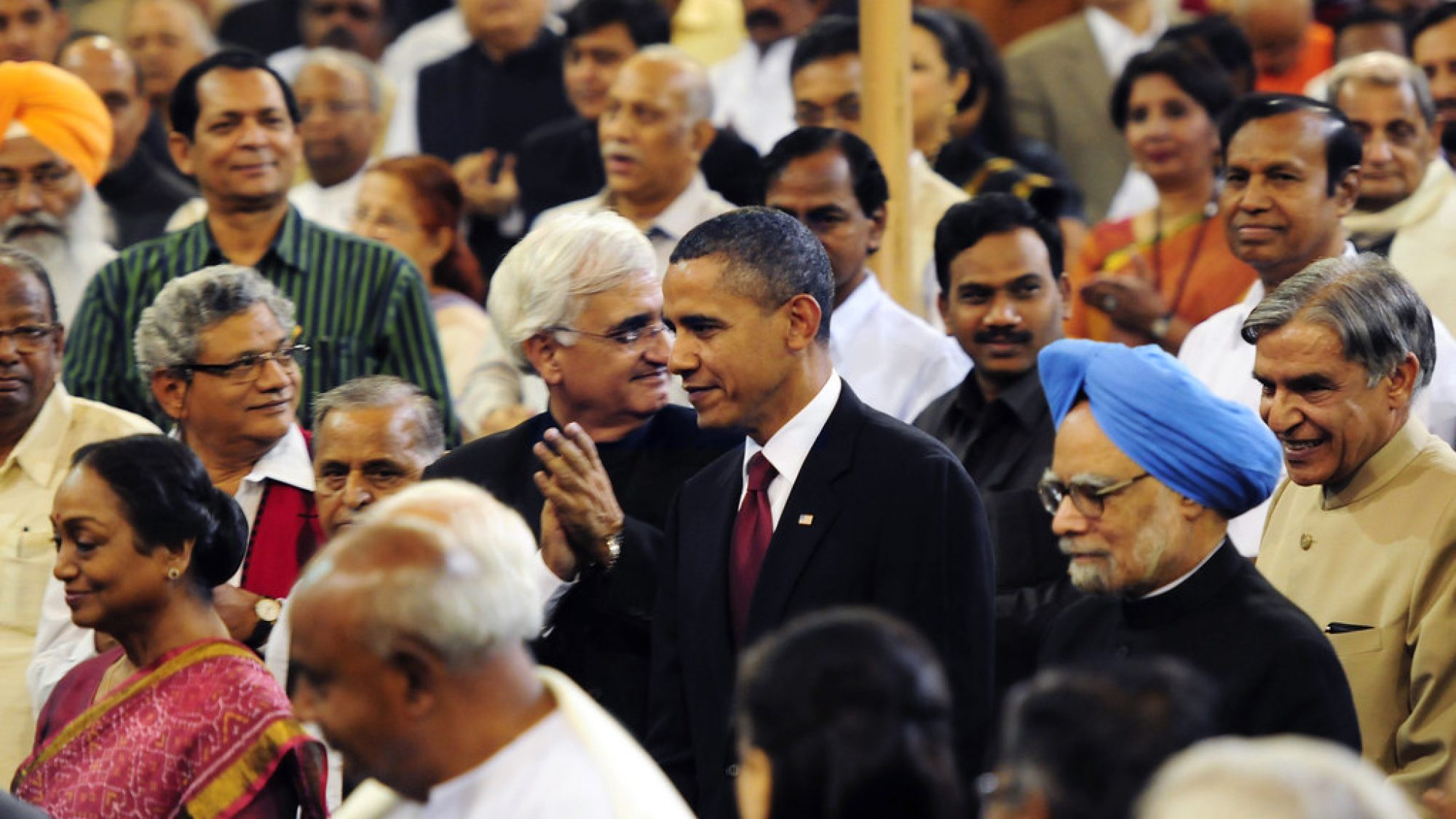
Title: The Indo-Pacific Strategy: Promoting Democracy in South Asia
This article assesses the likely impact of the US strategy in South Asia against the backdrop of the geopolitical competition for the Indo-Pacific. It argues that without placing democracy promotion via economic leverage at the heart of US strategy, the strategy will facilitate and accelerate the rise of an autocratic South Asia, unintentionally advancing Chinese goals.
The United States’ Indo-Pacific Strategy was created to counter China’s military and economic expansion in the Indo-Pacific region, a vast geographic area stretching from the Pacific to the Indian Ocean, comprised of six seas and twenty-four nation-states.
The strategy is rooted in American apprehension about China’s expansionist policies: claiming maritime territory in the South and East China Seas; billions of dollars of investments in infrastructure projects in crucial Indo-Pacific countries including Pakistan, Indonesia, Sri Lanka, Maldives, and Bangladesh; and trade coercion against Australia. The use of debt traps, the disbursement of expensive loans to build infrastructure projects and the subsequent seizure of those projects when debts are not repaid, have also been used by China to control key seaports in Sri Lanka and Pakistan and a key bridge in Maldives.
This article examines the likely impact of US strategy in small South Asian states important in the Indo-Pacific region and central to US strategy. In South Asia, China is emerging as a critical counter-force to India and is happily welcomed by India’s neighbors. Following the US withdrawal from Afghanistan, the Taliban is forming a good relationship with China. Bangladesh, Maldives, and Sri Lanka are not shying away from moving into China’s orbit, while India’s archrival Pakistan is already fully committed to the Chinese side. The crucial and overlooked dynamic in this scenario is that states characterized by authoritarian governments, dwindling press freedom, and shrinking civil liberties are easy prey to Chinese overtures.
American Strategy Will Strengthen Authoritarian Governments in South Asia
The intended outcome of the US Indo-Pacific strategy with regards to India is to “accelerate India’s rise and capacity to serve as a net provider of security and major defense partner; [to] solidify an enduring strategic partnership with India underpinned by a strong Indian military.” It also aims to “strengthen the capacity of emerging partners in South Asia, including the Maldives, Bangladesh, and Sri Lanka.”
In effect, the strategy will further strengthen the military, bureaucrats, and political elites and weaken already struggling activist movements within those states.
India recently ranked poorly in the World Report by Freedom House and the Swedish Variety of Democracy Index, the largest dataset assessing liberal democracies in the world. Indian Prime Minister Narendra Modi was recently described as a predator of media freedom by Reporters Without Borders, alongside Sheikh Hasina, Prime Minister of Bangladesh, and Imran Khan, Prime Minister of Pakistan. Both Sri Lanka and Maldives are ranked as partly free in the Freedom House Index.
Ironically, Bangladesh, Pakistan, Sri Lanka and Maldives already look in many ways similar to China, where individual liberties are limited, criticism of the state is criminalized, and human rights are violated while talk of economic growth and development dominates government agendas.
In this context, the American strategy offers no viable democratic alternative to China’s influence. Strengthening democratic institutions and culture will lead to strengthening democratic governance in the region. There needs to be a clearer vision of promoting a more open society, advocating democratic values, and supporting democracy activists on the ground who are resisting authoritarian shifts.
Skeptics might dismiss such concerns on the grounds that the Indo-Pacific strategy should be realistically analysed as a military strategy. While this may be true, such a claim misses the point that in many South Asian societies, military and security establishments operate and control public life to a degree unseen in Western democratic societies. It also avoids an understanding of the blurred lines between armed forces and internal law enforcement agencies, and their close collaboration with predatory political leadership.
In Bangladesh, the military operates business conglomerates including hotels, cement factories, and construction, and they are heavily engaged in the micromanagement of research, journalism, and related endeavours. They also own valuable land and housing estates where costly flats are sold at reduced rates to army officers. The armed forces are not a neutral domestic force primarily engaged in securing external borders, but rather a wing of government substantially embedded in the authoritarian setup of the state. In Maldives and Sri Lanka, for example, military and security establishments have allegedly been involved in covert political campaigns supporting majoritarian politics that leave minorities and critics insecure.
America’s closest ally in the region, India, may be considered the key security provider, but it comes with its own baggage. It has fomented serious criticism with regards to its relations with Bangladesh, Maldives, and Sri Lanka. India continued supporting the ruling Awami League in Bangladesh despite the party’s blatant election engineering in 2013 and 2018 and dismal human rights record. In Sri Lanka, India is unpopular with the trade unions, who see it as an expansionist power pushing the privatization of ports; it also has a history of supporting Tamils during the Sri Lankan civil war. There are reasons to believe the Sinhalese government has not forgotten that legacy. In Maldives, the opposition is advancing an India Out campaign. China is adept at exploiting such reserves of social grievance, and they have influenced key power brokers in these societies to sway the tide in their favor. When it comes to engaging on such a level, the US has taken a back seat.
Security Brokers, not Ideological Partners
The Indo-Pacific Strategy is likely to make political and military elites in Bangladesh, Maldives, and Sri Lanka the brokers of American security, not its ideological partners. In other words, it amounts to an affirmation of the lessening influence of America. If America’s emerging partners do not support democracy as a governance system, and prefer authoritarianism and infrastructure and economic development over social and political inclusion, mimicking the Chinese model, they are hardly going to commit to democratization.
America has historically projected itself as the leader of the free world, supporting free elections, free speech, the rule of law and the protection of human rights. But there is little reason to believe that countries in the Indo-Pacific, apart from India, will oppose and counter what China has to offer. Partnership with China is beneficial to these regimes, and there is little accountability for the development money it spends. America is hard-pressed to compete with such an approach, with a government liable for transparency in spending taxpayers’ money and a development agenda with strings attached. In sum, the scenario points to a grim picture for democratic South Asia, as authoritarian and populist regimes enjoy patronage from both China and the US.
A Values-Based Foreign Policy
The US strategy in its current form is unlikely to bring any short-term gains in the region. While disengagement is not an option, the strategy should promote the idea that the American project includes an ideological dimension, and is thus superior to the Chinese approach.
While the US continues to pursue its aim of straightening and supporting governments, it should also pursue its strategy of strengthening deterrence against democratic backsliding. This can be done in several ways: renewed engagement through public diplomacy programs; extending funding for American, international and local civil society organizations supporting human rights; and supporting media freedom. The US should engage with the elements within Indo-Pacific governments that support democratization. It should also use sanctions against human rights violators, using its economic strength as a bargaining tool. Surveys indicate that citizens in Asia prefer democracy, and it is the political and security elites who are depriving them of this basic right. Those elites can be swayed by economic leverage.
The extent to which an ideological programme will influence power-holders will depend on how willing the US is to utilize its economic leverage. Elites are motivated to retain power out of fear of losing personal safety and wealth. A US-supported democratization programme would need to emphasise anti-corruption measures but also ensure that elites are not targeted when they lose power by supporting an independent judiciary. Authoritarian elites also need to be reasonably convinced that they may regain power in the future. The US should support the establishment of independent election commissions.
The recent scenes from Afghanistan following the fall of Kabul to the Taliban should be a strong reminder that securitized American foreign policy through the advancement of military might has its limits. Despite spending of trillions of dollars in war, a localized effective ideological and cultural challenge to the Taliban could not take hold. America’s greatest weapon is its democratic culture and its foreign policy and China-containment strategy in South Asia should reflect that.
…
Mubashar Hasan PhD is an adjunct fellow at the Humanitarian and Development Research Initiative, Western Sydney University. He is the author of the book Islam and Politics in Bangladesh: The Followers of Ummah (Palgrave 2020). He is also the co-editor of the books: Radicalization in South Asia: Context, Trajectories and Implications (Sage, 2019) and Masks of Authoritarianism: Hegemony, Power and Public Lives in Bangladesh (Palgrave, 2021). He is a member of the Research Advisory Council at the RESOLVE Network located in the United States Institute of Peace and the Winner of the 2021 Outstanding International Alumni Award of the Griffith University, Australia.
Image Credit: “Photo WA-6334L” by public.resource.org is licensed under CC BY 2.0
More News

Critical maritime infrastructures (CMI), and in particular undersea communication cables, are increasingly under threat of attacks by malign actors who benefit from asymmetric capabilities and jurisdictional complexities in the maritime…

This article explores how the Palestinian crisis and the death of the two-state solution endangers the Hashemite Kingdom of Jordan. It illuminates the complicated relationship between Jordan, Israel, and Palestine…

This article explores the uncertain future of Arctic governance amid shifting global geopolitics. It argues that whether Washington and Moscow opt for confrontation or cooperation, multilateralism in the Arctic…